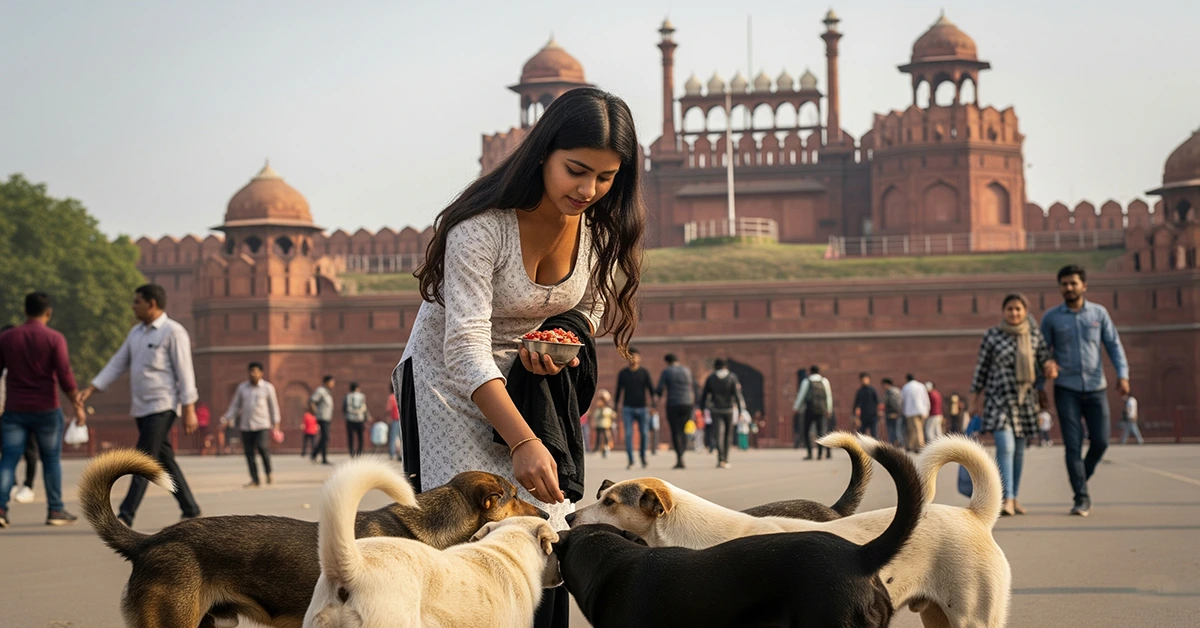
The Supreme Court on Friday, August 22, 2025, revised its earlier directive on the management of stray dogs in the National Capital Region, allowing sterilised and vaccinated dogs to be released back into their original localities while introducing a structured framework for feeding and control.
A three-judge special bench headed by Justice Vikram Nath, along with Justices Sandeep Mehta and NV Anjaria, made it clear that the August 11 order prohibiting the release of dogs from municipal shelters will remain suspended for the time being.
The judges emphasised that only dogs that have been sterilised and vaccinated may be returned, while those infected or suspected to be infected with rabies, as well as canines showing aggressive tendencies, must remain confined.
The revised decision comes against the backdrop of widespread concerns from animal rights organisations, citizens, and municipal authorities who had expressed unease over the earlier blanket order mandating relocation of all strays to shelters.
Critics had warned that the directive risked overburdening already crowded facilities and went against established animal birth control practices, which advocate sterilisation and re-release into the same territory.
Feeding Only In Designated Areas
A significant part of the new ruling centres around feeding practices. The bench directed civic authorities across Delhi and the NCR to create designated feeding zones for stray dogs in every municipal ward.
These spaces are to be determined on the basis of human population density and the concentration of dog populations.
The court further ruled that feeding of strays on public streets will not be permitted. Civic bodies must erect visible signboards near designated areas, clearly stating that dogs are to be fed only at those locations.
The court also authorised action under relevant legal provisions against individuals found feeding dogs outside these designated zones.
According to the bench, this move is intended to reduce human–animal conflict on busy streets, improve public hygiene, and ensure that feeding practices are regulated in an organised and safe manner.
Expansion Beyond Delhi-NCR
While the case originated in response to rising incidents of dog bites and rabies in Delhi, the court widened its scope to the national level.
It impleaded all states and Union Territories as parties in the matter and transferred to itself all pending petitions from various high courts concerning stray dog management.
By doing so, the Supreme Court signalled its intention to establish a uniform, pan-India framework for handling the issue.
The next hearing has been scheduled for eight weeks, giving state governments, municipal bodies, and animal welfare organisations time to present their inputs on practical solutions and challenges in implementing the revised order.
Background To The Case
The proceedings stem from a Suo Motu case initiated by the Supreme Court on July 28, 2025, following media reports of rising cases of stray dog bites in Delhi, many of which resulted in children contracting rabies.
The earlier August 11, 2025, order, passed by a two-judge bench, had directed civic authorities in Delhi, Noida, Ghaziabad, Gurugram, and Faridabad to immediately capture stray dogs from localities and move them into shelters.
That order had attracted criticism from animal rights groups, veterinarians and municipal bodies, who argued that it was impractical, contrary to the Animal Birth Control (ABC) Rules, and potentially inhumane.
They pointed out that relocating dogs outside their natural habitat often triggers territorial fights, disorients the animals, and does not reduce the population sustainably.
The Supreme Court has now sought to balance these concerns with the need to address public safety.
By insisting on sterilisation and vaccination before release, the bench aligned its order with scientific and legal frameworks already in place under the Prevention of Cruelty to Animals Act and the ABC Rules.
A Balancing Act
The order represents a significant recalibration by the apex court. On one hand, it acknowledges the dangers posed by unchecked stray dog populations, especially in urban centres where bites and rabies continue to be pressing public health issues.
On the other, it also respects animal welfare principles, ensuring that sterilisation, vaccination, and proper feeding are given priority over mass relocation.
The directive on feeding zones is likely to impact thousands of residents and volunteers who regularly feed stray dogs in their neighbourhoods.
While many animal lovers may see the restriction as curtailing their freedom, the court justified the move as a necessary step to avoid confrontations on roads and ensure safety for pedestrians, especially children and the elderly.
Municipal authorities in Delhi and the NCR now face the immediate challenge of setting up feeding zones, coordinating sterilisation drives, and managing shelters for aggressive or rabid animals.
The broader implication is that similar systems may need to be rolled out across the country once the Supreme Court finalises a nationwide policy in subsequent hearings.
Looking Ahead
The upcoming hearing in eight weeks will likely determine how state governments propose to fund and implement sterilisation and vaccination drives on a large scale.
Animal rights groups are expected to argue for humane treatment and scientific approaches, while civic bodies will seek clarity on enforcement and resources.
The Supreme Court’s intervention underscores the complexity of the stray dog issue in India, where urban growth, inadequate veterinary infrastructure, and conflicting public attitudes towards animals converge.
For now, the order provides temporary relief to animal welfare organisations by suspending the blanket sheltering mandate, while also attempting to reassure citizens concerned about safety and public health.
ALSO READ | “Angry Judgments Are Never Sensible,” Maneka Gandhi Slams SC's Stray Dogs Directive
The Story Mug is a Guwahati-based Blogzine. Here, we believe in doing stories beyond the normal.